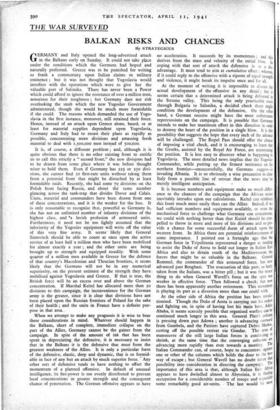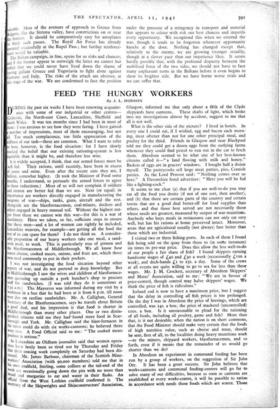THE WAR SURVEYED
BALKAN RISKS AND CHANCES
14, STRATEGICUS GERMANY and Italy opened the long-advertised attack in the Balkans early on Sunday. It could not take place under the conditions which the Germans had hoped and naturally preferred. Greece was to be punished for writing so frank a commentary upon Italian claims to military eminence ; but it was not thought that Yugoslavia would interfere with the operations which were to give her the valuable port of Salonika. There has never been a Power which could afford to ignore the resistance of over a million men, notorious for their toughness ; but Germany dare not risk overlooking the snub which the new Yugoslav Government administered, though she would be much more formidable if she could. The reasons which demanded the use of Yugo- slavia in the first instance, moreover, still retained their force. Hence, instead of an attack upon Greece alone, based, or at least for material supplies dependent upon Yugoslavia, Germany and Italy had to recast their plans as rapidly as possible, concentrating more divisions and amassing fresh material to deal with 1,5oo,000 men instead of 500,000.
It is, of course, a different problem ; and, although it is quite obvious that there is no other existing front to entitle us to call this strictly a "second front," the new divisions had to be drawn from some place where it was before thought wiser to hold them. Even if Germany has 225 or 250 divi- sions, she cannot find 50 first-rate units without taking them from a potential front that might be disturbed by at least formidable raids. Recently, she had some 70 divisions on the Polish front facing Russia, and about the same number glancing across the tank-trap that divides Dover and Calais. Units, material and commanders have been drawn from one of these concentrations, and it is the weaker for the loss. It is only reasonable to recognise that, powerful as Germany is, she has not an unlimited number of infantry divisions of the highest class, and 'a lavish profusion of armoured units. Furthermore, it need not be too lightly assumed that the inferiority of the Yugoslav equipment will write off the value of this very fine army. It seems likely that General Simovitch should be able to count at once upon the active service of at least half a million men who have been mobilised for almost exactly a year ; and the other units are being brought up to strength and equipped steadily. With some quarter of a million men available in Greece for the defence of that country's Macedonian and Thracian frontiers, it seems likely that the Germans will not be in any numerical superiority, on the present estimate of the strength they have. mobilised against Yugoslavia and Greece. If that is true, the British force will be an excess over and above the German concentration. If Marshal Keitel has allocated more than 50 divisions to this campaign, the inconvenience for the German army is the greater, since it is clear that divisions have not been placed upon the Russian frontiers of Poland for the sake of their health ; and the units in France have a definite pur- pose in that area.
When we attempt to make any prognosis it is wise to bear these considerations in mind. Whatever should happen in the Balkans, short of complete, immediate collapse on the part of the Allies, Germany cannot be the gainer from the campaign. In spite of the amount of ink that has been spent in depreciating the defensive, it is necessary to insist that in the Balkans it is the defensive that must form the greatest weakness of the Allies. It is only a particular form of the defensive, elastic, deep and dynamic, that is so formid- able in face of any but an attack by much superior force. Any other sort of defensive tends to have nothing to offset the momentum of a planned offensive. In default of unusual intelligence, its fire-power is too evenly distributed to prevent local concentrations in greater strength and the consequent chance of penetration. The German offensive appears to have no acceleration. It succeeds by its momentum ; and this derives from the mass and velocity of the initial blow. In coping with that sort of attack the defensive is at a dis. advantage. It must tend to aim at cumulative effect whereas, if it could reply to the offensive with a riposte of equal strength and violence, it might break its impulse once and for all.
At the moment of writing it is impossible to discuss the actual development of the offensive in any detail ; but it seems certain that a determined attack is being delivered in the Struma valley. This being the only practicable route , through Bulgaria to Salonika, a decided check there might condition the development of the defensive.. On the other hand, a German success might have the most unfortunate repercussions on the campaign. It is possible that Germany intends to make her maximum effort in this direction in order to destroy the heart of the position in a single blow. It is this possibility that suggests the hope that every inch of the advance will be challenged. The Rupel Pass should offer the chance of imposing a vital check, and it is encouraging to learn that the Greeks, assisted by the Royal Air Force, are maintaining the position. It is less easy to discover what is happening in Yugoslavia. The most detailed news implies that the Yugoslav Commander, while putting up the firmest resistance on his northern frontier—unsuccessfully, the Germans suggest—is invading Albania. It is so obviously a wise precaution to clear Italy from a possible line of retreat that the news may be merely intelligent anticipation.
It is because numbers and equipment make so much differ- ence to the chances of the campaign that the African sector inevitably intrudes upon our calculations. Keitel can reinforce this front much more easily than can the Allies. Indeed, if wz had sufficient numbers and equipment available, or even the mechanised force to challenge what Germany can concentrate, we could wish nothing better than that Keitel should be com- pelled to throw in more and more of his divisions and so pro- vide a chance for some successful- form of attack upon the western front. In Africa there are potential reinforcements of some importance. I pointed out a fortnight ago that the German force in Tripolitania represented a danger as tending to assist the Duke of Aosta to hold out longer in Italian East Africa and also to detain south of the Mediterranean the forces that might be so valuable in the Balkans. General Rommel, the commander of this armoured • force, has new advanced past Benghazi. The evacuation of this port, so lately taken from the Italians, was a bitter pill ; but it was the wisest thing to do when General Wavell's force on the spot was weaker in effective force. Then followed a check; but now there has been apparently another retirement. This movement is playing its part as a diversion more than one could wish.
At the other side of Africa the position has been revolu- tionised. Though the Duke of Aosta is carrying out his orders and fighting on, in spite of having lost his rnpin base, Addis Ababa, it seems scarcely possible that organised warfare can be continued much longer in this area. General Platt's canal& is pressing down past Adowa ; another is advancing eastward from Gambela, and the Patriots have captured Debra .Niathos, cutting off the possible retreat via Gondar. The area of manoeuvre of the still large Italian forces is continuing to shrink, at the same time that the converging columns are advancing more rapidly than ever towards a meeting. The Italian Commander can, of course, hope to concentrate against one or other of the columns which holds the door to the best way of escape ; but General Wavell has no doubt taken thar possibility into consideration in directing the campaign-
jiiC
importance of this area is that, although Italian East Africa appears to have dwindled almost to Abyssinia, it is finc.ling occupation for a considerable number of troops and esr,--IallY some remarkably good air-units. - The last would he mc)st owl*. Most of the avenues of approach to Greece from ulgaria, like the Stroma valley, have constrictions on or near frontier. It should be comparatively easy for aeroplanes w block such passes. The Royal Air Force has already perated successfully at the Rupel Pass ; but further reinforce- ent would be valuable. / The Balkan campaign, in fine, opens for us risks and chances; d if the former appear to outweigh the latter we cannot but effect that we could never have lived down the shame of caving gallant Greece and Yugoslavia to fight alone against ermany and Italy. The risks of the attack are obvious, at this stage of the war. We are condemned to face the position under the pressure of a stringency in transport and material that appears to colour with risk our best chances and imperils every opportunity. We recognised this when we entered the war, though it tends to be forgotten whenever opportunity knocks at the door. Nothing has changed except that, relatively to the enemy, we are growing stronger steadily, though at a slower pace than our impatience likes. It seems hardly possible that, with the profound disparity between the mobilised force of the two sides, we should not have to face many unpleasant turns in the Balkans before it even begins to show its brighter side. But we have borne worse trials and we can suffer that.































 Previous page
Previous page